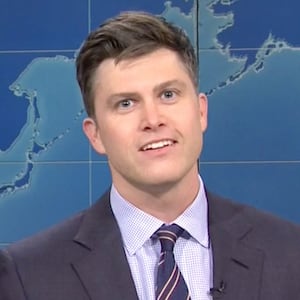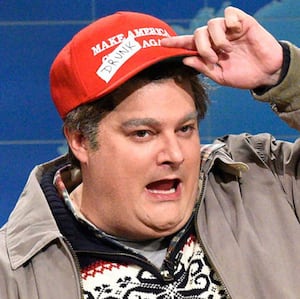It was the middle of Donald Trump’s presidency, and he was—yet again—mad at Saturday Night Live. And he wanted the federal government to help him settle the score.
In March 2019, the then-president of the United States had just watched an episode of the long-running, liberal-leaning NBC sketch comedy series (it wasn’t even a new episode, it was a rerun), and grew immediately incensed that the show was gently mocking him.
“It’s truly incredible that shows like Saturday Night Live, not funny/no talent, can spend all of their time knocking the same person (me), over & over, without so much of a mention of ‘the other side,’” Trump tweeted, long before he was banned from Twitter for inspiring a violent mob. “Like an advertisement without consequences. Same with Late Night Shows. Should Federal Election Commission and/or FCC look into this?”
ADVERTISEMENT
It was, on its face, a ridiculous question and threat, as SNL is obviously satire, and therefore a form of protected speech in America that pissed-off commanders-in-chief have no authority to directly subvert. However, then-President Trump went further than simply tweeting his displeasure with the late-night comedians and SNL writers’ room. The internal discussions that followed, between the former leader of the free world and some of his political and legal advisers, once again underscored just how much Trump wanted to use the full weight and power of the U.S. government to punish his personal enemies.
According to two people familiar with the matter, Trump asked advisers and lawyers in early 2019 about what the Federal Communications Commission, the court system, and—most confusingly to some Trump lieutenants—the Department of Justice could do to probe or mitigate SNL, Jimmy Kimmel, and other late-night comedy mischief-makers.
To those who heard it, Trump’s inquiries into what federal regulations could be used to bust the likes of Kimmel and SNL were more nuisance than constitutional crisis. “It was more annoying than alarming, to be honest with you,” one of these sources recalled. However, the conversations further showed, in the pettiest of ways, how the 45th U.S. president was keen on turning the country’s top law enforcers into something more akin to his own personally retained law firm.
Emails released by the House Oversight Committee, first reported by The New York Times, also show how Trump tried to enlist the Justice Department in his attempts to overturn Joe Biden’s victory with demands to investigate a number of wild conspiracy theories.
In one case, Trump tried to spark the Justice Department’s interest in the “ItalyGate” conspiracy theory, which claimed that an Italian defense contractor had somehow used a military satellite to hack voting machines and swing the election for Biden.
In another case, Trump’s assistant emailed acting attorney general Jeffrey Rosen a series of talking points intended to defend a bizarre and since-debunked “audit” of Dominion voting machines in Antrim County, Michigan, by the security firm Allied Security Operations Group. The talking points released by the House Oversight Committee bore no signs of authorship, but on the same day Trump’s assistant sent them to Rosen, conservative outlets ran excerpts from the same document as a release by the “Trump legal team in conjunction with [Allied Security Operations Group].”
And as was the case in his crusade against liberal late-night television, most of these operations fell apart or didn’t provide Trump with his desired result of devastating retribution or the complete subversion of American democratic norms.
In early 2019, Trump had to be repeatedly advised that the “equal-time” rules to which he appeared to refer wouldn’t even apply in this situation, given that late-night shows and NBC sketch comedy are clearly staged satire, and thus not bound by the same requirements of other forms of broadcast TV and radio.
The other source, who has a law degree, said that when they briefly discussed this with Trump more than two years ago, they made a point of saying that the Justice Department, in particular, doesn’t handle these matters, anyway. Trump seemed disappointed to hear that there was no actual legal recourse or anything that the FCC or DOJ could do to punish late-night, anti-Trump comedy.
“Can something else be done about it?” Trump replied, according to this source, to which they responded with some version of “I’ll look into it.” (This person says that to this day, they have not, in fact, “looked into it.”)
Representatives for SNL and Kimmel did not provide comment on this story as of Monday evening.
In a statement released on Tuesday, Trump mischaracterized The Daily Beast’s story and called it “fabricated.”
“The story that I asked the Department of Justice to go after ratings-challenged (without Trump!) Saturday Night Live and other late-night Losers, is total Fake News,” Trump wrote.
(The Daily Beast did not report that Trump directly asked the Justice Department to go after the late-night shows but rather asked his advisers what the department and other federal agencies could do to probe them.)
Nonetheless, Trump endorsed the concept of criminalizing late night comedy shows’ satirization of the former gameshow host.
“I do believe that the 100% one-sided shows should be considered an illegal campaign contribution from the Democrat Party,” Trump wrote.
In his 2019 quest to crack down on the comedians, he seems to have confused the FCC rules he was invoking in fury, explains Paul Matzko, a scholar on technology policy at the Cato Institute.
The “equal time” rule refers to a specific FCC that wouldn’t apply to SNL. “Equal time meant that if a radio or TV station offered time to one political candidate they had to offer comparable time on the same terms to an opposing candidate,” later broadened to “not only to candidates themselves and their campaigns directly but any kind of allied group,” says Matzko.
Instead, Matzko says Trump is likely confusing the equal time rule with the “fairness doctrine,” a practice that demanded that broadcasters provide “fair and balanced” coverage of controversial issues of public importance. The FCC, however, stopped enforcing the doctrine in 1987 and formally revoked it in 2011.
And in the years since 2019, Trump has not lost his interest in casually monitoring or denouncing the American late-night comics who he feels have been mean to him. Trump will take the time to do this even when he’s consumed with following the ongoing, conspiracy-theory-fueled efforts to show that Trump won the 2020 election that he clearly lost to Joe Biden. In an interview early this month, MyPillow CEO and diehard Trump ally Mike Lindell told The Daily Beast that the ex-president recently called the MAGA pillow magnate to congratulate him for appearing on Jimmy Kimmel Live! and for sticking it to the anti-Trump talk show host.
In the past, Trump made no secret of his distaste for SNL or Alec Baldwin’s portrayal of him (“unwatchable,” “stinks,” and “not funny”) during his time in office. Throughout a series of thumb-launched missives at the show on Twitter, Trump appeared to have convinced himself that SNL writers were legally obligated to distribute their satirical barbs with “equal time” to both Democrats and Republicans.
The show amounted to “nothing less than unfair news coverage and Dem commercials,” Trump tweeted in 2018, and wondered if that observation “should be tested in courts, can’t be legal?”
The relationship between Trump and NBC, in particular, soured early in his presidential campaign when the channel dropped his beauty pageants following racist remarks by the then-candidate calling Mexican immigrants “rapists.”
Through his administration, the specific flashpoints for Trump’s ire with NBC shifted—SNL, MSNBC (“Comcast slime”), NBC News, and NBC chairman Andy Lack—but the threats against the channel remained focused on Comcast’s acquisition of the company, a regulatory chokepoint that gave the Trump administration at least theoretical leverage over the channel. Comcast acquired a majority stake in NBC during a deal approved under the Obama administration. Like his threats against tech companies for their moderation of election misinformation, Trump used the guise of consumer protection and antitrust enforcement to register his displeasure with the channel’s programming.
During the 2016 presidential campaign, Trump enjoyed much-criticized softball appearances on major NBC shows like SNL and Jimmy Fallon’s Tonight Show. Despite the olive branches, then-candidate Trump still held a grudge against the channel and its parent company.
Comcast’s purchase of NBC “concentrates far too much power in one massive entity that is trying to tell the voters what to think and what to do,” Trump said during an October 2016 policy speech threatening media conglomerates with antitrust action. Deals like Comcast’s acquisition of NBC “destroy democracy” and “poison the mind of the American voter,” Trump complained.
In 2018, Trump caused a brief panic in trading of Comcast shares when he fired off a tweet warning that the “American Cable Association has big problems with Comcast. They say that Comcast routinely violates Antitrust Laws.”
But like his constant threats to break up Big Tech, they were nothing more than rage tweets.
By 2020, when Trump threatened to “do everything possible to destroy [Comcast’s] image because they are terrible” during a rally in South Carolina, the markets barely noticed.









